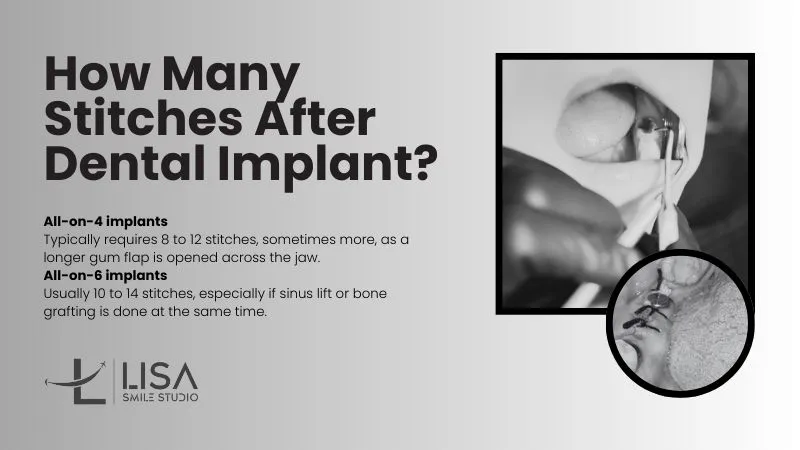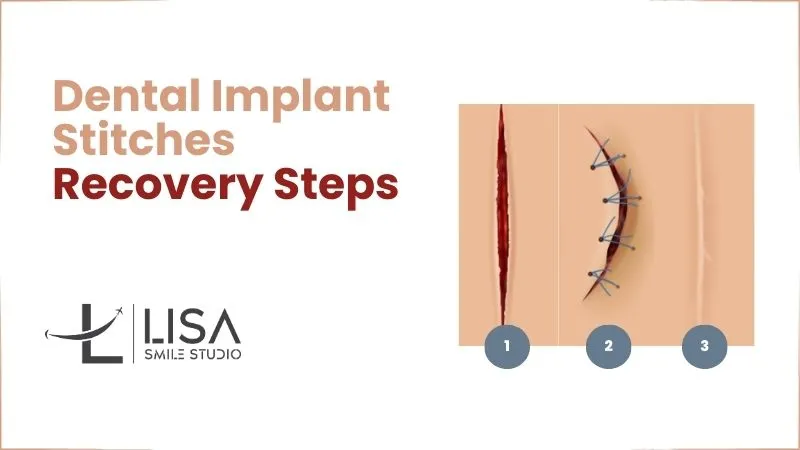Why stitches after dental surgery?
Dental implant stitches are like tiny seatbelts for your gums. They hold everything together so your body can do its healing thing without chaos.
No stitches? The tissue might move around, bleed more, or take way longer to close up. They also help keep out food and bacteria. And not all stitches are the same. Some dissolve on their own (you don't even have to think about them), others your dentist will take out in a few days. Either way, they're just part of the plan to make healing smoother and faster. They're part of what makes sure you bounce back with less swelling, less bleeding, and fewer complications.

Do all dental implants require stitches?
No, not all dental implants need stitches.
But most of them do, unless you're one of the lucky ones getting what's called a flapless implant.
So, what's that? Basically, a flapless implant means the dentist doesn't make a big cut or “flap” in your gum. Instead, they just punch a small hole right where the implant goes. Quick, clean, and barely any bleeding. Since there's no big incision, there's nothing to stitch back together so yeah, no stitches needed. That said, flapless techniques aren't for everyone. Your gum thickness, bone structure, and overall mouth health have to be just right.
One 2023 research paper showed that resorbable sutures (like polyglycolic acid) reduced post-op discomfort and eliminated the need for suture removal appointments without compromising healing.
So, if you hear “no stitches” after implant surgery, don't panic, it just might mean your dentist used a flapless method. And if they didn't? Stitches are just there to help things heal clean and smooth.
What affects the number of stitches after dental implants?
How many stitches you'll get after a dental implant surgery depends on a few basic things:
- How many implants are going in
- What kind of implants you're getting (like All-on-4 or just one tooth)
- And how the dentist opens up your gums during the surgery

If they make a big cut (called a flap), you'll need more stitches to close it up.
But if they do it “flapless” (just a small hole), no need at all.
Average number of stitches by implant type:
Single implant (1 tooth):
Usually 2 to 4 stitches are enough to close the gum tissue.
Multiple individual implants (e.g., 2–3 teeth):
Expect around 4 to 6 stitches, depending on spacing and gum opening.
Typically requires 8 to 12 stitches, sometimes more, as a longer gum flap is opened across the jaw.
Usually 10 to 14 stitches, especially if sinus lift or bone grafting is done at the same time.
All-on-8 implants:
May need 12 to 16 stitches, depending on bone quality and gum thickness.
Bonus tips you should know
Most stitches dissolve on their own in about 7 to 14 days. So, you won't need to go back to get them out unless they're non-dissolvable (your dentist will tell you). Everyone heals a little differently. The more implants you get and the bigger the area they work on, the more stitches you'll have. But modern techniques like flapless surgery can really cut that number down.
Do stitches after a dental implant hurt?
There's usually some discomfort after getting stitches from a dental implant. But “pain” isn't the right word for most people. It's more like a dull soreness, tightness, or maybe a little throbbing in the first day or two. Dentists usually numb the area super well during the procedure, so you don't feel the stitches going in at all. And afterward? Most of the time, over-the-counter painkillers (think ibuprofen or paracetamol) are enough to keep things totally manageable.
What happens if stitches are not used?
The gum might not close up right. You could get bleeding, food sneaking in, or even an infection. Healing takes longer, and it's just... not fun.
A 2021 study found that most patients felt “significant improvement within 3–5 days” after implant surgery, especially with dissolvable sutures. Women tended to heal slightly slower than men, but the difference wasn't huge.
How long do stitches stay after a dental implant?
Usually around 7 to 14 days. That's how long most dental stitches stick around after an implant. But here's the good part: most of them dissolve on their own. Yes, no need to go back just to get them pulled out. These are called resorbable stitches, and your body naturally breaks them down over time.
Now, if your dentist uses non-dissolvable stitches, you need a quick visit to have them removed, usually about a week later. But they'll tell you upfront if that's the case.
Tips for faster healing of sutures after a dental implant
- Drink plenty of water. Seriously, hydration helps everything heal faster. Don't poke the stitches. Not with your tongue, not with your fingers.
- Stick to soft foods. Think mashed potatoes, yogurt, soup. Keep it gentle.
- Avoid super hot drinks. That piping-hot coffee? Skip it for now.
- No smoking. If you ever needed a reason to quit, this is it, slows healing big time.
- Rinse gently with salt water. Warm, salty water helps keep things clean and calm.
- Keep your head elevated when sleeping. Less swelling, better healing.
- Don't brush the area too soon. Give it some space to settle.
- Apply a cold compress the first day. Reduces swelling like magic.
- Take it easy, no workouts. Let your body focus on healing, not cardio.
- Follow your dentist's medication advice. Don't skip doses or change the plan.
- Avoid spicy or acidic foods. Your stitches won't thank you for that salsa.
Show up to your follow-ups. Your dentist can catch problems early.

